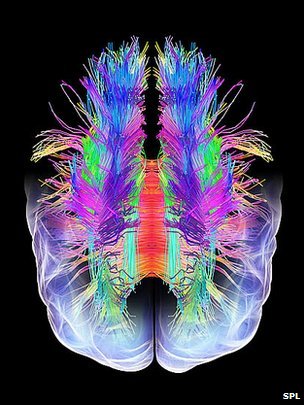- Jul 10, 2004
- 24,526
- 16,976
- 1,405
Brain map seeks to unlock mysteries of the mind
(CNN) -- You have a brain with billions of neurons. You have thoughts, and you do things because of those thoughts. But how do tiny cells translate into thoughts and actions?
The Brain Activity Map initiative is seeking answers to that question. As described in a proposal published online Thursday in the journal Science Express, a group of prominent researchers is proposing a large-scale effort to create new tools to map the human brain in unprecedented detail. This could lead to treatments for brain disorders such as epilepsy, autism, dementia, depression and schizophrenia, as well as ways to restore movement in paralyzed patients.
"We don't actually understand (how circuits of neurons) generate all these interesting behaviors we have, like speech and language and thoughts and memory," said John Donoghue of Brown University's department of neuroscience.
"What we're hoping is that as the tools develop -- and they will continue to develop -- we have additional insights that will lead to better medical devices."
Donoghue and his colleagues are eagerly waiting to see if the federal government will approve new money to pump into the project; the recent spending cuts known as the sequester could affect that prospect. But the scientists' proposal states that the project should be "funded by a partnership between federal and private organizations," and they're already beginning to ramp up their collective efforts, according to George Church, professor of genetics at Harvard Medical School, who is one of the key minds behind the project.
There are already indications of federal interest. President Barack Obama, in his State of the Union address in February, said, "If we want to make the best products, we also have to invest in the best ideas," and alluded to scientists "mapping the human brain to unlock the answers to Alzheimer's." Along with talking about drug development and materials science, Obama stated, "Now is not the time to gut these job-creating investments in science and innovation."
Brain map seeks to unlock mysteries of the mind - CNN.com
(CNN) -- You have a brain with billions of neurons. You have thoughts, and you do things because of those thoughts. But how do tiny cells translate into thoughts and actions?
The Brain Activity Map initiative is seeking answers to that question. As described in a proposal published online Thursday in the journal Science Express, a group of prominent researchers is proposing a large-scale effort to create new tools to map the human brain in unprecedented detail. This could lead to treatments for brain disorders such as epilepsy, autism, dementia, depression and schizophrenia, as well as ways to restore movement in paralyzed patients.
"We don't actually understand (how circuits of neurons) generate all these interesting behaviors we have, like speech and language and thoughts and memory," said John Donoghue of Brown University's department of neuroscience.
"What we're hoping is that as the tools develop -- and they will continue to develop -- we have additional insights that will lead to better medical devices."
Donoghue and his colleagues are eagerly waiting to see if the federal government will approve new money to pump into the project; the recent spending cuts known as the sequester could affect that prospect. But the scientists' proposal states that the project should be "funded by a partnership between federal and private organizations," and they're already beginning to ramp up their collective efforts, according to George Church, professor of genetics at Harvard Medical School, who is one of the key minds behind the project.
There are already indications of federal interest. President Barack Obama, in his State of the Union address in February, said, "If we want to make the best products, we also have to invest in the best ideas," and alluded to scientists "mapping the human brain to unlock the answers to Alzheimer's." Along with talking about drug development and materials science, Obama stated, "Now is not the time to gut these job-creating investments in science and innovation."
Brain map seeks to unlock mysteries of the mind - CNN.com





